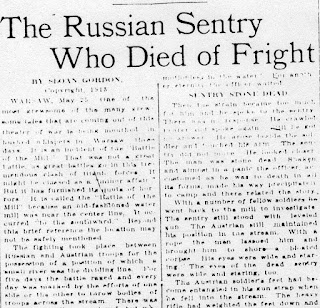Sloan Gordon
Deep in the bowels of the Dayton Metro Library reside hundreds of microfiche reels containing back issues of Dayton newspapers dating from the turn of the century. I spent many nights and weekends squinting at blurry images researching the period covering my stories. It was during a search of articles pertaining to the Great War that I discovered Sloan Gordon. As near as I could determine Sloan Gordon was a war correspondent for Cox newspaper assigned to the Eastern Front. A visit to the Dayton Daily News personnel archives failed to produce any further information. Thus inspired by his name and his series of detailed dispatches from the Eastern front, I gave Sloan Gordon new life in Banners.
* * *
"As a boy, Sloan Gordon had devoured Stephen Crane’s glowing reports from Cuba during the 'splendid
little war' with Spain and later Jack London’s stories from the Russo-Japanese
War. Ever since, Sloan had seen nothing
but a war correspondent in his future.
He envisioned himself in the front lines sending back dispatches of
glorious victories and humiliating defeats.
His enthusiasm only increased when nine months ago, Cox sent him to
follow in Jack London’s footsteps to Eastern Europe. Others may have considered the Eastern Front
a minor arena in the real war between Germany and France, but to Sloan it was a
dream come true and the opportunity of a lifetime."
* * *
 |
| Jack London |
* * *
 |
| 1915 Article by Sloan Gordon |
* * *
Sloan Gordon appears in Banners as a war correspondent sending periodic dispatches back to the Cox newspaper company. I used Gordon's style of writing to fabricate the events on the Eastern front and create a timetable weaving through the story.In a 1915 news report, which appears almost verbatim in Banners, Sloan relays the story of the children orphaned or abandoned by the war. These "wretched waifs" as he called them, were flotsam awash in a sea of misery. The bezprizorniki (little ones without protectors from bez-without, prizor-protectors, niki-little ones) became the basis for a subplot in Slogans and morphed into the gang Stefan aspires to join.
* * *
 |
| Sloan Gordon's article on the lost children |
* * *







